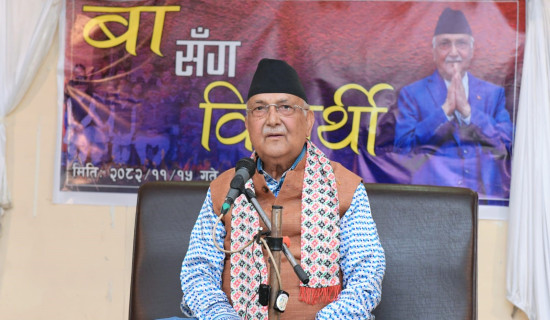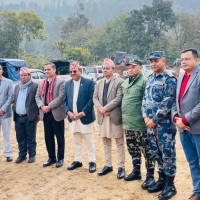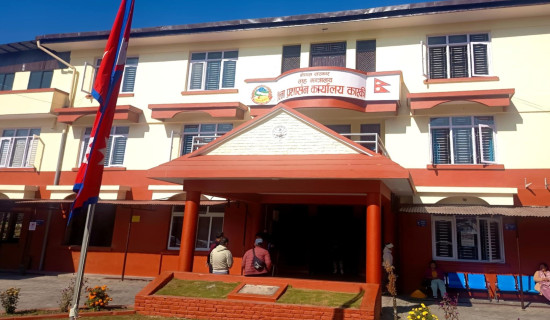- Friday, 27 February 2026
Performance of Parliament determines success of federalism
By Pallav Bhusal,Kathmandu, Apr. 6:The latest winter session of Nepal’s federal parliament, that ended on April 1, has once again laid bare the challenges that continue to delay the country’s legislative progress. After 61 days of proceedings, amounting to 118 hours and 21 minutes of discussions, only nine bills were passed, five of which were ordinances, turned into bills.
While lawmakers and political parties have long vowed to prioritise legal reforms essential for the implementation of federalism, their actions in this session tell a different story, one dominated by political strategy and house obstructions over individual interests rather than legislative necessities.
Despite promises, crucial laws such as the Federal Civil Service Bill and the School Education Bill, which are considered foundational for strengthening Nepal’s federal governance structure, remain stalled. Instead of dedicating their time to legislating, political parties have been more focused on power struggles for forming and dissolving governments. They have also brought the House to a standstill over issues like the removal of Nepal Electricity Authority Chief Kul Man Ghising and the arrest of Rastriya Swatantra Party (RSP) leader Rabi Lamichhane in connection with a cooperative fraud case. The persistent deadlock has raised serious concerns about the effectiveness of the Parliament in fulfilling its primary role.
Mahesh Kumar Bartaula, Chief Whip of the CPN-UML, maintains that the session was productive despite the visible challenges. “This was our fifth session, and we have completed four previous sessions. In those, we successfully passed 11 bills. In the winter session, altogether we have managed to pass some vital bills, making it more positive than the past sessions in terms of legislative work,” he said.
Four bills that were first registered in the Upper House have been converted into Acts. They are related to corruption control, electronic transactions, legislation act and safe transactions. The five substitution Bills included ‘Financial Procedures and Fiscal Responsibility (First Amendment) Ordinance, 2081’, ‘Economic and Business Environment Reform and Investment Promotion Amendment Ordinance, 2081’, ‘Privatisation (First Amendment) Ordinance, 2081’, ‘Ordinance to Amend some Nepal Acts related to the Promotion of Good Governance and Public Service Delivery, 2081’ and the ‘Ordinance to Amend some Nepal Acts related to Cooperatives, 2081’.
Bartaula argues that the legislature could have passed at least four additional bills had the opposition not resorted to frequent obstruction of proceedings over minor issues. “If the opposition had played a more constructive role instead of frequently disrupting the session, we could have achieved even more. Nonetheless, we have laid the groundwork for passing key federalism-related laws including the Federal Civil Service Bill and School Education Bill in the first week of the budget session,” he added.
The government, meanwhile, has not demonstrated the urgency required to push forward legislative agendas. By relying heavily on ordinances, temporary laws that bypass parliamentary scrutiny, the government has sent a troubling message about its commitment to democratic processes.
While ordinances may be necessary in extraordinary situations, their frequent use in place of permanent legislation sets a bad precedent for governance.
Rupa Sosi (Chaudhary), Whip of the CPN (Maoist Centre), describes the session as disappointing and inadequate.
“The winter session is supposed to be dedicated to lawmaking, bringing forward pending bills and moving the legislative process ahead efficiently. But looking at this session, it did not seem successful. The government did not appear keen on making the most of it,” she said. She further criticised the government for its reliance on ordinances rather than enacting full-fledged laws. “It looked as though the government convened this session merely to push through the ordinances it preferred, rather than engaging in the comprehensive lawmaking process.
Running a country through ordinances alone is not a healthy democratic practice,” she added.
The repeated obstructions and inefficiency in lawmaking reflect a larger political culture in Nepal where parliamentary proceedings are often used as a battleground for power struggles rather than a forum for governance. Political parties, both in government and opposition, have frequently resorted to obstructing parliamentary proceedings as a means of protest. While a strong opposition is necessary for democracy, continuous disruptions over individual issues rather than substantive policy debates weaken the very foundation of the legislature.
Krishna Bahadur Rokaya, Chief Whip of the Nepali Congress at the National Assembly, expressed concern over inordinate delays in passing critical laws. “The winter session is primarily a legislative session, and we took this more seriously than in previous sessions. We were committed to making it truly legislative, but unnecessary obstructions made it difficult,” he said.
While Rokaya defends the ordinances brought by the government, calling them constitutional and beneficial for the people, he acknowledges that the failure to pass the intended 25 bills is a significant setback. “We had prepared to pass 25 bills this time, but due to the continuous obstruction by the opposition parties, it could not be accomplished.
The Civil Service Bill, the School Education Bill, and the Nepal Police Bill should have been passed in this session, but delays have pushed them into the next session. However, it will be the first priority in the budget session and will be passed,” he added.
The inefficiency and sluggishness of the Parliament have also drawn sharp criticism from Santosh Pariyar, Chief Whip of the Rastriya Swatantra Party, who believes that Nepal’s lawmakers are not giving lawmaking the priority it deserves. “This session, like previous ones, has not been satisfactory. The Civil Service Bill and the School Education Bill have been stuck in committees for far too long. Our Parliament lacks effectiveness. Political parties are more focused on securing their own positions and forming coalitions rather than delivering on their legislative duties. The government must take urgent steps to ensure that the next session does not repeat this failure,” he said.
Constitutional expert Kashi Raj Dahal offers a broader perspective on the root cause of the problem. He argues that Nepal’s Parliament is failing because lawmakers do not fully grasp the seriousness of their legislative responsibilities. “This winter session once again showed that parliamentarians are pursuing their own political interests over passing crucial laws.
The government appeared overly reliant on ordinances, possibly because it was confident it had the necessary numbers to push them through. But essential laws such as the Federal Civil Service Bill, the School Education Bill, and the Nepal Police Bill were ignored,” he said. Dahal stresses that the neglect of the Civil Service Bill is particularly alarming. “This is fundamental to making the federal structure successful. It should have been a top priority, yet lawmakers seem indifferent. If this trend continues, Nepal’s federal system risks becoming ineffective,” he added.
The inability of Parliament to function effectively is not just a bureaucratic issue, it has real consequences for people’s lives. When laws that shape the country’s governance remain stuck in committees or are endlessly delayed, it is ordinary citizens who bear the brunt.
Federalism, which Nepal embraced with hope through the 2015 constitution, was meant to bring power closer to the people. But without a strong legislative framework to guide it, this vision remains unfulfilled.
Laws like the Civil Service Bill are designed to ensure that government functions smoothly at all levels, making sure that decisions are made efficiently and fairly, whether in Kathmandu or in the most remote village. Likewise, the School Education Bill is crucial for giving provincial and local governments the clarity and authority they need to improve education systems in their regions. Yet, with these bills still in limbo, Nepal’s transition to a truly federal system remains incomplete, leaving many communities without the services and governance model they were promised.
There is an urgent need for the Federal Parliament and lawmakers to gain trust as the budget session approaches. Lawmakers should focus on passing the essential laws, specially in the Federal Parliament putting aside their rivalries. They should rise above their partisan agenda and work together to strengthen Nepal’s legal framework for the people they represent. The opposition should not always obstruct the sessions over minor disagreements and ensure that the parliamentary proceedings progress effectively.
The public trust in the current institution and lawmakers will only continue to fade if the Federal Parliament fail to deliver what was promised by the 2015 constitution.
The decisions and performance by the lawmakers will shape the path for generations to come. It is high time that the ruling government turned responsible towards the federal parliament. This also includes the top leaders of the political parties to come together when the issue of making laws to make the federal system a success.
Parliament is a space where real change is initiated, where the voices of the people are heard and where the nation’s future is decided with a sense of responsibility and vision.








-square-thumb.jpg)







